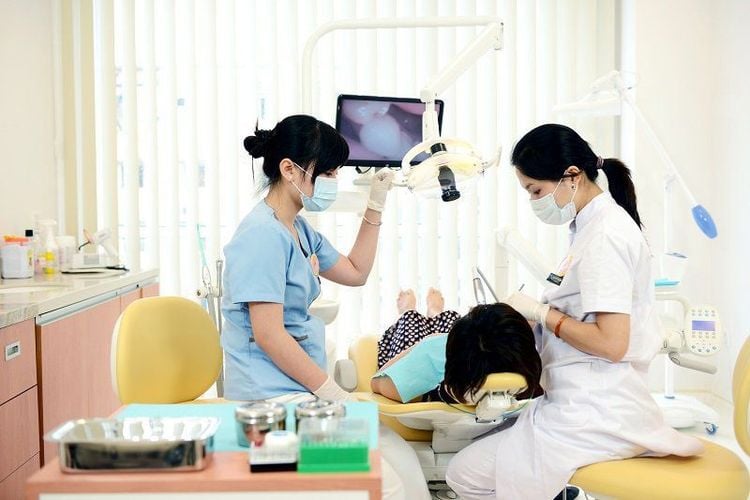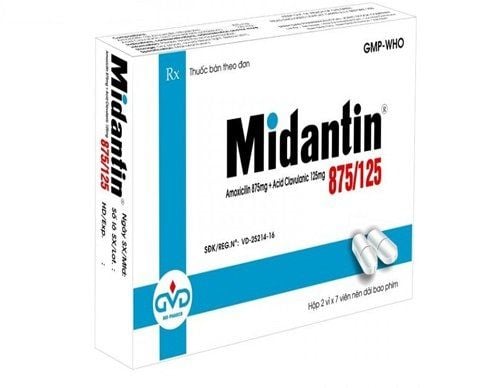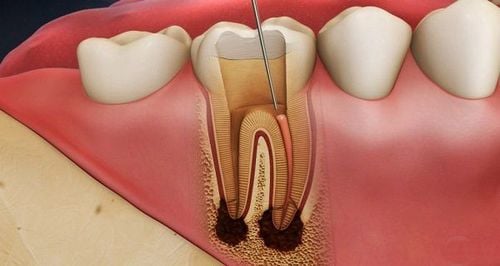This is an automatically translated article.
When you eat something hot or cold, and you feel a tingling sensation in one of your teeth or a sharp pain, you probably have pulpitis. You need to go to the doctor right away for a timely examination to avoid dangerous injuries and complications caused by pulpitis.
1. What is pulpitis?
Pulpitis occurs when the inner pulp of a tooth, which is made up of blood vessels and nerves, becomes inflamed. The inflammation is usually reversible, but sometimes the inflammation is irreversible and the pulp cannot heal on its own.
In both cases, it is best to visit your dentist for treatment, they can help restore your teeth in the best way.
2. What causes inflammation and toothache due to pulpitis?
Bacterial infection is the most common cause of pulpitis. However, many things can increase your chances of developing pulpitis, including:
Cavities close to the pulp of the tooth Trauma to the tooth Repeated invasive procedures Cracked teeth Grinding teeth. Pulpitis can be divided into two types: reversible and irreversible pulpitis.
If your toothache occurs with extreme heat but goes away quickly, your pulpitis may be reversible. If the pain is severe, persists after a temperature change, occurs spontaneously or involves other teeth, making it difficult to locate the exact location, then you may have irreversible pulpitis. Regardless of the type of toothache you experience, you should contact your dental professional as soon as possible for an evaluation. Your dentist will take appropriate measures to treat the inflamed pulp and help put an end to your toothache.

Hình ảnh răng bình thường và đau do viêm tủy răng
3. Treatment of tooth pulp inflammation
3.1. Treatment of reversible pulpitis Treatment of reversible pulpitis will improve the inflammation and the discomfort will go away.
For example, if your pulp is inflamed due to decay that has reached the nerve endings, removing the cavity and placing a filling will help the pulp heal and eliminate any further tooth pain and discomfort.
However, if the cause is not treated, the infection will get worse leading to irreversible damage to the pulp.
3.2. Irreversible pulpitis treatment Irreversible pulpitis, which is when the inflammation doesn't go away even when the cause is removed. Inflammation causes the pulp tissue to die. With irreversible pulpitis, the pulp is no longer able to heal on its own. The body's immune system breaks down dead tissue.
However, if there is too much infection and dead tissue for your immune system to handle, an abscess can form. The infection can spread to surrounding bone or other areas of the body.
In these cases, the dentist must conduct a root canal to remove the dying pulp, which will relieve the root pain. Besides root canal, another option is extraction, which is not usually the treatment of choice.
4. Preventing pulpitis
In cases other than accidental tooth trauma, there's a lot you can do to keep your teeth strong.
Follow a good oral care routine that includes daily interdental cleaning and twice-daily proper brushing to protect teeth against cavities and provide a comprehensive dental cleaning. Proper dental care also helps preserve existing fillings to protect your pulp.
Schedule regular visits with your dental professional so that any areas of decay can be identified while still small and far from the pulp.

Định kỳ kiểm tra sức khỏe Nha khoa giúp ngăn ngừa viêm tủy răng
If you have a habit of grinding your teeth, consider wearing a mouth guard while you sleep to protect your teeth from cracking or breaking.
Reduce or eliminate sweets like candy and sodas in your daily diet to keep your teeth safe from sugar, which is one of the main causes of tooth decay.
Treatment of pulpitis is something that needs to be done soon, if not detected and treated in time, it will cause pain and discomfort for you. In more severe cases, pulpitis can lead to necrosis and loss of teeth. So, once your teeth appear symptoms such as: Large cavities; teeth have signs of sharp pain, aching; discolored teeth .... need to go to reputable dental facilities immediately for examination and treatment to avoid dangerous complications for teeth
Currently, root canal treatment is being performed regularly at the Department of Dentistry. maxillofacial, Vinmec International General Hospital; The technique is performed by a team of specialists with the support of modern equipment, along with the technique of root canal treatment and sealing of the root canal system with cold Gutta percha using a rotating file.
Root canal treatment uses a foot length meter to help the dentist work to the full working length, File proteper machine helps to clean and shape the canal well, saving working time, saving customers Opening the mouth longer than manually doing the file, the X-ray machine helps to check the artificial pulp before, during and after welding.
Root canal treatment is a technique that has been around for a long time, but treatment with machine files has only been around for a few years, and Vinmec always approaches new technologies to take care of oral health in the best way. customer.
Please dial HOTLINE for more information or register for an appointment HERE. Download MyVinmec app to make appointments faster and to manage your bookings easily.
Reference source: Colgate.com












